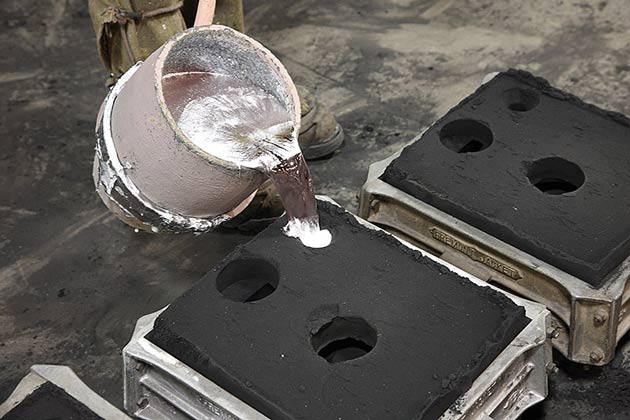8 Easy Facts About Stahl Specialty Company Shown
Table of ContentsAll about Stahl Specialty CompanyStahl Specialty Company Things To Know Before You BuyTop Guidelines Of Stahl Specialty CompanyNot known Facts About Stahl Specialty CompanyAll About Stahl Specialty Company
The refined distinction lies in the chemical material. Chemical Contrast of Cast Light weight aluminum Alloys Silicon advertises castability by decreasing the alloy's melting temperature level and boosting fluidness during casting. It plays a vital function in enabling detailed mold and mildews to be filled accurately. In addition, silicon adds to the alloy's toughness and use resistance, making it useful in applications where sturdiness is vital, such as vehicle components and engine elements.It also boosts the machinability of the alloy, making it simpler to refine into ended up products. By doing this, iron adds to the total workability of aluminum alloys. Copper enhances electric conductivity, making it beneficial in electrical applications. It also improves corrosion resistance and contributes to the alloy's overall stamina.
Manganese contributes to the stamina of light weight aluminum alloys and improves workability. It is typically utilized in functioned light weight aluminum items like sheets, extrusions, and accounts. The presence of manganese aids in the alloy's formability and resistance to breaking during construction procedures. Magnesium is a lightweight aspect that gives strength and influence resistance to aluminum alloys.
It allows the production of lightweight parts with exceptional mechanical residential or commercial properties. Zinc boosts the castability of light weight aluminum alloys and helps control the solidification procedure throughout casting. It enhances the alloy's toughness and firmness. It is frequently found in applications where elaborate shapes and great details are essential, such as decorative castings and particular auto components.
Stahl Specialty Company Fundamentals Explained
Because aluminum-silicon alloys have excellent casting properties, high gas buildings, simple procedures, and outstanding corrosion resistance, aluminum-silicon alloys are most generally utilized in the die-casting industry in the house and abroad. At the exact same time, aluminum-silicon alloys are additionally reasonably very early and commonly recognized alloys created and made use of in die-casting. After continual research and renovation, a lot of the existing worldwide mainstream aluminum-silicon alloys have actually been wrapped up and are absolutely nothing greater than A356, A360, A380, ADC12, B390, and A413.
The key thermal conductivity, tensile strength, yield stamina, and prolongation vary. Amongst the above alloys, A356 has the highest thermal conductivity, and A380 and ADC12 have the least expensive.

Excitement About Stahl Specialty Company
In precision spreading, 6063 is fit for applications where intricate geometries and high-quality surface coatings are paramount. Instances consist of telecommunication rooms, where the alloy's remarkable formability enables smooth and visually pleasing layouts while preserving structural integrity. In the Lights Solutions sector, precision-cast 6063 components create elegant and efficient lighting fixtures that require elaborate shapes and good thermal performance.
(http://prsync.com/stahlspecialtycompany/)
The A360 exhibits exceptional prolongation, making it optimal for complex and thin-walled components. In accuracy spreading applications, A360 is appropriate for sectors such as Customer Electronic Devices, Telecommunication, and Power Devices.

In accuracy casting, light weight aluminum 413 radiates in the Consumer Electronic Devices and Power Tools markets. This alloy's premium rust resistance makes it a superb choice for exterior applications, guaranteeing durable, resilient items in the mentioned markets.
More About Stahl Specialty Company
The aluminum alloy you pick will considerably influence both the spreading procedure and the residential properties of the last product. Because of this, you must make your choice very carefully and take an educated method.
Identifying the most suitable light weight aluminum alloy for your application will indicate evaluating a wide array of features. The very first category addresses alloy attributes that impact the production process.
The alloy you choose for die casting straight influences a number of elements of the casting process, like just how very easy the alloy is to deal with and if it is prone to casting defects. Warm fracturing, also referred to as solidification cracking, is a normal die spreading problem for aluminum alloys that can lead to interior or surface-level rips or cracks.
The smart Trick of Stahl Specialty Company That Nobody is Talking About
Particular light weight aluminum alloys are more vulnerable to warm fracturing than others, and your option needs to consider this. An additional common defect found in the die casting of aluminum is die soldering, which is when the cast stays with the die wall surfaces and makes ejection hard. It can harm both the actors and the die, this content so you should look for alloys with high anti-soldering residential properties.
Rust resistance, which is already a remarkable characteristic of aluminum, can differ significantly from alloy to alloy and is a necessary particular to think about relying on the environmental conditions your item will be exposed to. Put on resistance is one more property generally sought in aluminum products and can differentiate some alloys.